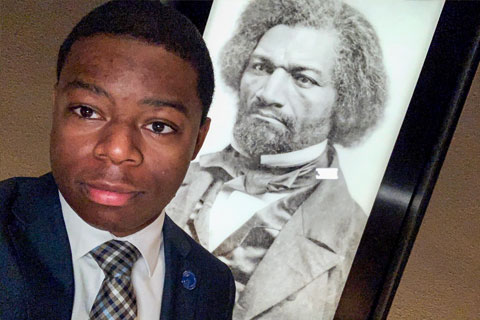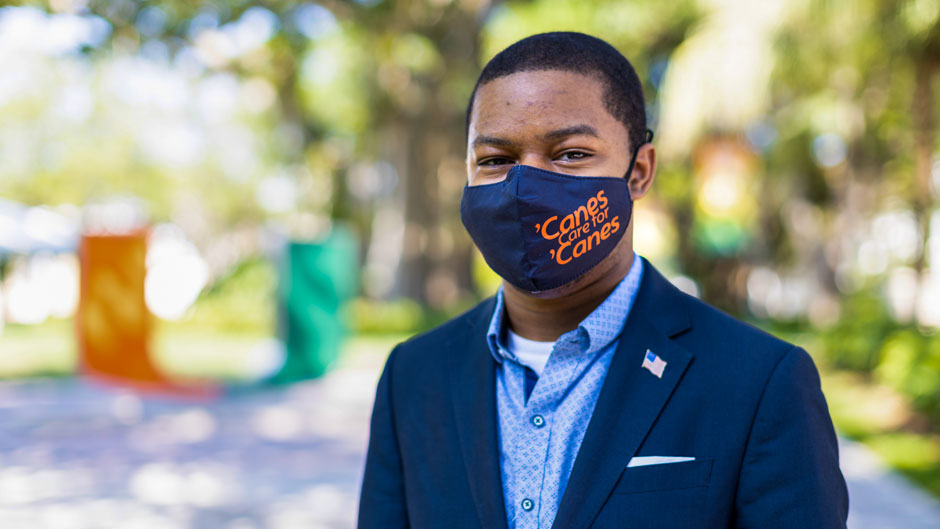When University of Miami junior Paul Douillon visited Washington, D.C., in early 2020, he took just one photo of himself at the Museum of African American History and Culture. It was next to a portrait of Frederick Douglass.
At the time, Douillon merely admired the pioneering abolitionist for his courage to escape slavery, educate himself, and become the first African American to serve appointed positions in the United States government.
Douillon never dreamed he’d soon have the opportunity to walk in Douglass’ footsteps in Ireland, where the social reformer and statesman fled in 1845 with a bounty on his head and slavecatchers on his trail.
But during a St. Patrick’s Day video call, Douglass’ great, great, granddaughter, Nettie Washington Douglass, Vice President Kamala Harris, and the prime minister of Ireland, Micháel Martin, congratulated Douillon for being named a 2021 Frederick Douglass Global Fellows. He is one of 14 high-achieving U.S. college students of color who will spend a month on the Emerald Isle learning about leadership, intercultural communication, and social justice.

“Being the age Frederick Douglass was when he escaped slavery … I believe there is nothing stopping me from creating change, like he did,” the 20-year-old criminology major, who transferred to the University last fall from Miami Dade College, told the panel. “I firmly believe that it is time for the youth of my generation to be the change that we seek.”
On the call, Harris noted how the acceptance Douglass found in Ireland shaped the former slave’s writings and helped shift the U.S. perspective on slavery.
“He wrote, ‘In Ireland, I am not treated as a color, but as a man,’ ” Harris said, adding, “And he imagined I’m sure … that you would be coming behind him, so I’m counting on all of you to live up to that potential.”
Her words were not lost on Douillon.
A first-generation college student and the son of Haitian immigrants who encourage their children to excel, Douillon—who is also a musician, political activist, skilled campaigner, and pre-law student—has taken advantage of every opportunity he could in college. The first University student to win the Douglass fellowship funded by the Council on International Exchange and Ireland’s Department of Foreign Affairs, Douillon found a passion for improving campus life at Miami Dade College’s Homestead campus, where he was elected student government president (his twin brother, Angelo, now holds the post). Through this leadership position, Douillon got involved in local and state politics to lobby for bills and ordinances affecting his campus, as well as to take the trip to D.C.
Meanwhile, to share his love of music with others, Douillon offered piano and guitar lessons to students in between classes through a group he founded with Angelo called Musical Minds (Douillon plays seven instruments). The group partners with the nonprofit Guitars over Guns to provide music instruction and mentoring to at-risk high school students, and it often plays music at Homestead Hospital to cheer patients as well.
“Whatever I do, I want to find a way to serve others and improve their experience,” he said. “If I can just inspire one person to wake up and become a leader, not just a follower, and help steer our school, community, and country in the right direction, then it’s worth it.”
At UM, after just three weeks of commuting to the Coral Gables Campus, Douillon was elected as a senator on the Student Government, where he represents transfer students. He is also treasurer of the Sociology and Criminology Club, co-project coordinator for United Black Students, social media coordinator for Tau Sigma National Honor Society, and serves as a Dean’s ambassador for the College of Arts and Sciences.
“Paul is a great person, and I realized quickly that if he takes an interest in something, he will become an active participant,” said Jan Sokol-Katz, a senior lecturer in sociology and director of the undergraduate program, who recommended Douillon for the fellowship. “He is strongly concerned with social justice issues, and he wants to make a difference. I am proud of Paul and I’m confident that this fellowship will help him make the difference he desires.”
Douillon’s interest in criminal justice stemmed from his realization that many government policies intended to lower crime disproportionately penalizes Black residents. After completing his degree at the University, he plans to attend law school and then possibly run for elected office.
But like his other interests, Douillon does not just ponder these goals. He gets involved. When he met Miami-Dade Public Schools School Board candidate Luisa Santos, who was just 30 years old, at a Homestead City Council meeting, the two connected because of her dedication to ending the school-to-prison pipeline, which disproportionately affects young Black men. Soon, Douillon became Santos’ communications team lead. And in November, she defeated a career politician for the southeast Miami-Dade seat. At the same time, Douillon worked as the Creole phone-bank leader for state representative Dotie Joseph, whose district includes the North Miami area. Joseph also won her election.
“We are the future religious, political, and economic world leaders and I think it’s important we begin to work in these spaces now,” said Douillon, whose older sisters Sashine and Gina are also interested in government. “I don’t plan on waiting until I am 30 or 40 years old to do so, and I hope to inspire other young leaders to make a difference in our community and our world.”
But he also recognizes the value of leaving the U.S. to gain perspective.
“In London, I thought a lot about how their law enforcement system functioned and worked, and it taught me a lot about how we can reform ours,” he said, noting that most police officers in the United Kingdom do not patrol the streets with guns. “As future leaders, it’s important to look at the diversity of thought around the world. Then we can learn what works, what doesn’t, and critique or fix what is broken in our country.”
If he does go into politics, Douillon thinks that he is fortunate that he has already made an impression on the first female vice president. On the video call, just three fellows spoke, and Douillon was one of them. After his speech, he muted himself and watched as Harris grinned and said, “well done.” Then, he and his family cheered.
“My family was so happy they could not contain their excitement,” said Douillon, whose parents A.G. and Ruth have supported him wholeheartedly. “It’s a memory I’ll forever cherish, and I am so grateful to be representing the University of Miami on this trip. To be able to walk the same path that Douglass did and to experience some of the same things he did in Ireland is something that will change my life forever.”

